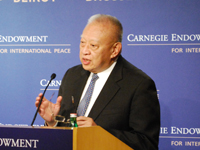Registration
You will receive an email confirming your registration.
IMGXYZ2489IMGZYXIn recent months, the United States and China have gone through a rough patch in bilateral relations. Issues such as currency revaluation, U.S. arms sales to Taiwan, and cyber-security have caused tensions to flare on both sides. Despite this negative trend, such setbacks represent a very short period in a much longer timeframe of U.S.-China cooperation.
Chee Hwa Tung, the founding chairman of the China-United States Exchange Foundation and the vice chairman of the Eleventh National Committee of the Chinese People’s Political Consultative Conference, spoke about some of the opportunities and challenges facing U.S.-China relations. His remarks focused particularly on the importance of building mutual understanding and trust. The discussion was introduced by Carnegie’s Jessica Matthews and moderated by Carnegie’s Douglas Paal.
An evolving relationship
Since the United States and the People’s Republic of China established diplomatic relations in 1979, there have been enormous changes in both the bilateral relationship and in the international system, Tung explained.
- Common threats: While the 20th century focused on defense against a common enemy, the post-Cold War era will be shaped by joint efforts of the international community in dealing with global challenges like energy security, climate change, food security, and resource scarcity.
- Economic interdependence: Continued U.S.-China cooperation is needed to sustain the global economic recovery. Both countries must work together to strengthen fiscal responsibility, reject protectionism, and restore confidence in the Euro.
Bilateral frictions
Although President Obama’s visit to China in November 2009 established a very positive, comprehensive, and forward-looking foundation for U.S.-China relations, Tung suggested that long-term trends have continued to plague cooperation between the two nations.
- Innate differences: The United States and China have divergent historical experiences and cultural practices. They are also in different stages of development, so although their overall objectives are largely the same, their tactics for achieving them often differ.
- Misperceptions and lack of trust: By engaging in more direct exchange, the people of the United States and China can build understanding and mutual strategic trust.
A way forward
Tung stressed that the single most important thing the United States and China can do to improve the global situation is to ensure that the economy continues to recover. He also outlined other ways that the two countries can foster positive bilateral and international relations.
- China should continue to tell its story: In the last 60 years, China has helped an unprecedented number of people rise above poverty, live in dignity, and enjoy prosperity. Tung emphasized that China is a force for peace and harmony, and it is making great strides to bring this dream within the reach of all its citizens.
- The United States should not lose confidence in itself: Despite recent economic and social problems, the United States still has the best human and natural resources available to any advanced nation. It needs to remain a strong presence in the global community; as intra-Asian trade takes off, the United States should not revert to isolationism. It must continue to engage with the world.
